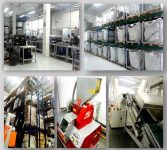
Brazilian recycling center uses RFID technology to optimize reverse logistics
[ad_1]
RFID technology is a cutting-edge technology and innovation of Sinctronics’ Green IT Innovation Center. Sinctronics is located in Sorocaba, Brazil. It operates the first electronic product recycling center in Brazil. It can process 100 tons of waste equipment every month and generate raw materials for the manufacture of new products, thereby reducing the extraction of natural resources, saving energy and reducing carbon dioxide emissions. .
Carlos Ohde, general manager of Sinctronics, said: “This is the world’s first waste electronic product recycling center built next to a new product manufacturing plant. It can provide raw materials and parts for the neighboring manufacturing plant. Flextronics next to the recycling center mainly produces printers for HP. .”

When receiving an obsolete printer, the first step Sinctronics needs to do is to check the model and manufacturer of the machine to determine the material of the machine.This step can be passedRFID(Assuming that the printer has done the marking) or it can be done manually, but manual often requires more time and will increase the cost of recycling.
Sinctronics production manager Mileide Alves Cubo explained: “RFID technology can provide a lot of help in the process of identifying waste products. It allows staff to easily know the information of the machine materials to be recycled. HP printers are equipped with RFID tags, which also allows us to more Easily identify the materials they use.”
After a truck full of discarded electronic products arrives at the Sinctronic receiving area. The employee will automatically read the item information and store it with an RFID reader for subsequent disassembly and separation of parts. Before RFID tags, these tasks need to be done manually.
Since RFID technology allows Sinctronics to know the composition of parts and components of used products before disassembly, it can also make disassembly work more efficient.
Sinctronics will dispose of the plastic after removing all materials from the waste product. Ohde said: “Metal materials such as iron, steel and copper will be sent to companies that recycle these materials.”
After processing these plastics, the company will reproduce them as new parts. The on-site analytical laboratory will perform some necessary tests on it.
Ohde pointed out: “We manage reverse logistics and trace the entire process to ensure that it meets government regulations. By the end of 2015, all electronic components must meet Brazil’s solid waste policy.”
Sinctronics recycles electronic product waste into new product raw materials and parts, thereby saving energy and other natural resources. In addition, the company has increased its innovation efforts to provide training and experiments for sustainable IT. Ohde said: We have created sustainable solutions for Brazil’s electronics industry. “
At present, Sinctronics receives monthly inquiries for orders larger than the processing of used equipment at the front desk. Ohde said: “We process 100 tons of used equipment every month, but our production capacity is 6 times that.”
(Exclusive manuscript of rfid world network, please indicate the source author for reprinting!)
[ad_2]


